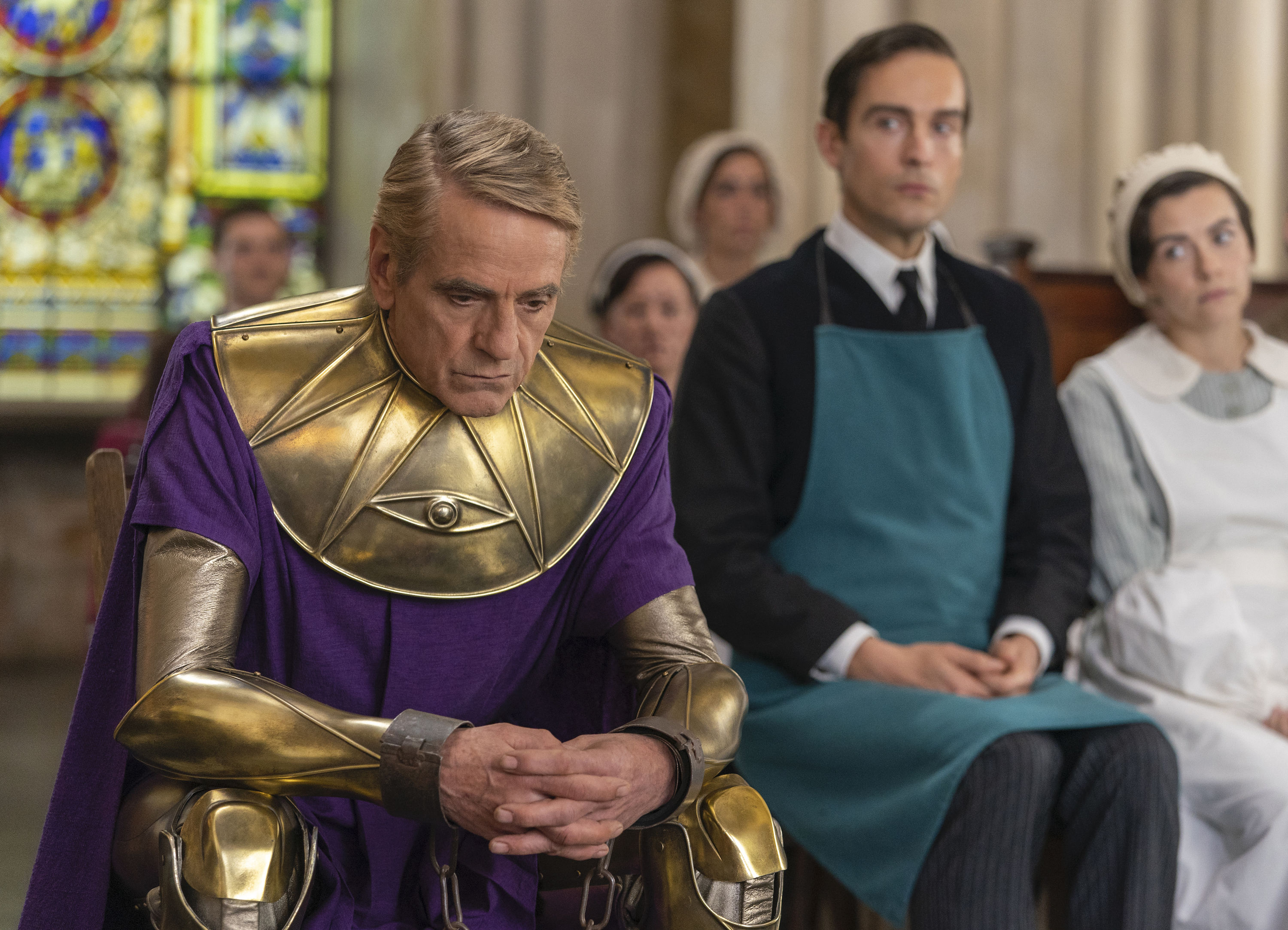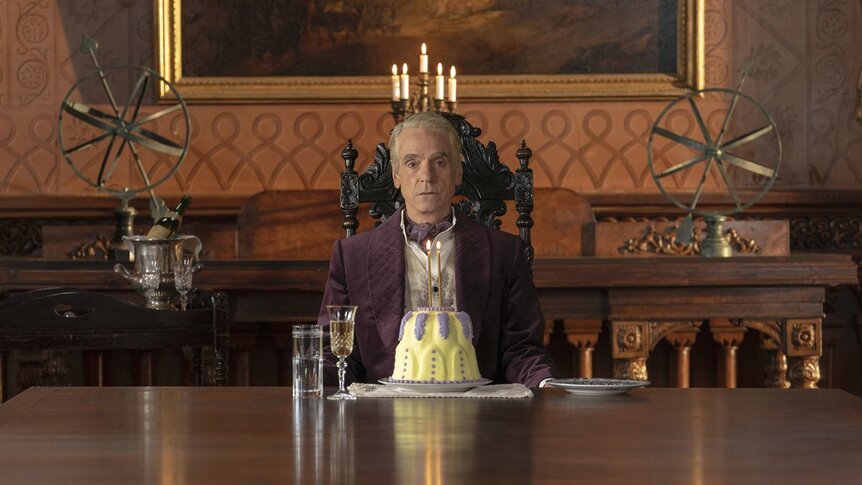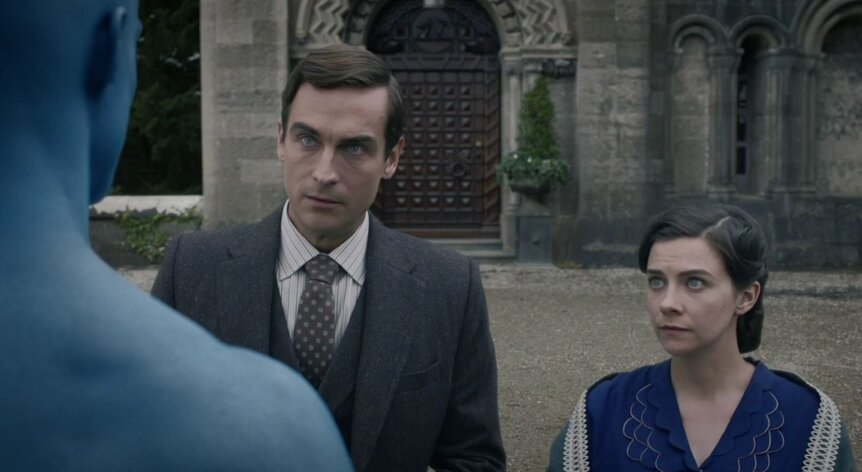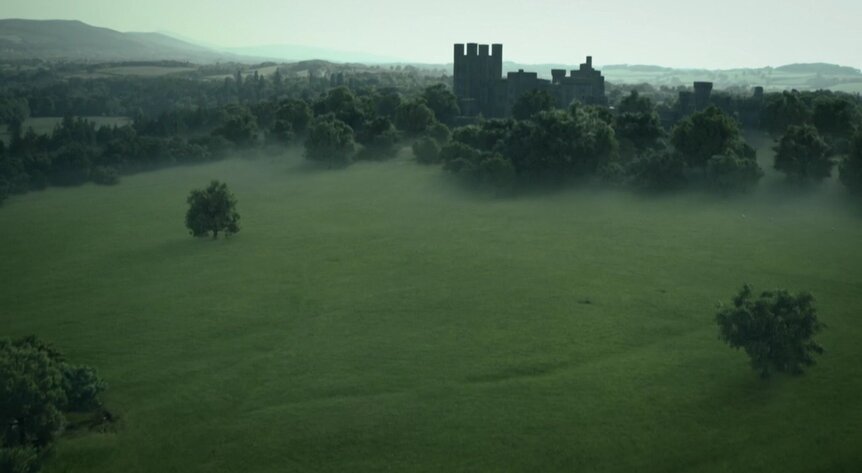Create a free profile to get unlimited access to exclusive videos, sweepstakes, and more!
The paradoxical nature of Adrian Veidt's utopia on Watchmen

"Will I live to see my utopia?"
Adrian Veidt (Jeremy Irons) asked this question in the penultimate episode of Watchmen, frustrated by humanity's inability to abstain from building world-destroying weapons. However, even a place devoid of conflict isn't enough for the man who was Ozymandias.
For someone obsessed with playing god, it turns out paradise is not what the "smartest man on the planet" was craving. Instead of heaven, the lush green landscape becomes a prison he cannot escape from. Is a life without conflict a life without pleasure?
The television adaptation of Alan Moore and Dave Gibbons' graphic novel depicts what followed after Veidt orchestrated the 1985 attack, which killed millions in New York City. In a bid to deescalate Cold War tensions between the United States and the Soviet Union, his plan via a giant psychic squid attack initially worked. Too preoccupied with "alien" invaders, the world did not end as a result of nuclear armageddon. However, a flashback to 2009 reveals nations have returned to their nuclear reactor ways.
"Why oh why do they need to keep making their godforsaken bombs?" Veidt ponders out loud. Frustrated by the self-destructive nature of man and his lack of accolades for saving the world, he leaps at the offer of the utopia he has been craving when Dr. Manhattan (Yahya Abdul-Mateen II) extends the possibility to him. As soon as he agrees, however, he isn't given the chance to back out. There is no cooling-off period for this once-in-a-lifetime opportunity.
Because Veidt hasn't been able to take credit for "saving" the world in 1985 and maintaining peace in the present, this offer sounds incredibly enticing. He quickly finds himself in a similar position to his old friend, disillusioned by the constant worship of subjects whose desire is only to please their master, but he doesn't possess the power to fly away. Even the most beautiful locations can turn into a hellscape.
Heaven is not a place on earth, despite what Belinda Carlisle sang, and in the case of this Watchmen adaptation, Dr. Manhattan didn't go to Mars but Jupiter — more specifically, he ended up on Europa, one of Jupiter's 79 confirmed moons. With a wave of his hands and in the space of 90 seconds, he did what he took God six days to achieve. His Garden of Eden doesn't include a snake to tempt; instead, it is the image of the place he felt at his safest.
Before becoming Dr. Manhattan, Jon Osterman was a man of flesh and blood. In 1936, he fled Germany with his father after his mother left them for an SS officer (and because his father had Jewish heritage). A manor house in the beautiful English countryside provided sanctuary in their time of need. Young Jon witnessed the lord and lady of the manor having sex while he hid in a closet, which the pair later explained was an act of love in the bid to have another baby as their young son had died a few years before. They gifted him a Bible, explaining the story of Genesis before imploring him to "make something beautiful" while existing in this life.
Dr. Manhattan made their wish come true 77 years later, which is why he teleported the manor house from his childhood to the moon location. He also made his version of Adam and Eve in their image; every person on Europa wears these two faces. In "A God Walks into Abar," he tells Angela (Regina King) that he left paradise so he could meet her, which sounds like a corny pickup line but is partly true. Because he experiences time all at once, he has left Europa and he is still there. Paradoxes litter the landscape of this episode — the chicken and the egg, humans feeling safer only when they have the ability to build weapons and the unsatisfactory nature of infinite love. The verdant and untouched land is completely devoid of conflict, which is what Veidt has been striving for on Earth; nevertheless, this soon becomes his greatest burden. His dream of utopian living becomes his nightmare existence.
Conflict is at the heart of every good story. Without obstacles to overcome, everything loses meaning. It probably doesn't help that this version of utopia isn't specifically Veidt's vision. Sure, it looks beautiful, but he has no personal connection to this place, manor house, or the two figures — played throughout by Tom Mison and Sara Vickers — whose faces he has to look at on every single person. If Veidt had few moral qualms about killing millions to save many more, then he has no issue slaughtering the identical figures he has an endless supply of gestating in the lake on Europa.
The servants are designed to bow to his every whim with the exception of the mask-wearing Game Warden (also Mison). He is the only one who exerts any level of discipline over Veidt whenever he attempts to escape or breaks the rules. Veidt's desire to abandon Europa is the crime for which he will be punished, but these loyal subjects are incapable of fully committing to this sentence.
Ironically, Veidt is at his happiest when dealing with the messiness of humanity, which is why he spends the majority of his time on Europa trying to escape. It might be beautiful, but this place is an endless nightmare of cake and adoration. As someone who refers to the population of Earth as "his children," it is far from surprising that utopia is not enough. It is the fight to make humanity better that drives Veidt, and a world with beings designed to put the interests of others before their own does not need saving. His arrogance in believing he is the only person that possesses the power to save humanity is also his biggest folly.
Veidt got his paradise and the adoration he dreamed of, but his happiness was short-lived. The Game Warden provided a certain level of opposition, but ultimately it was not enough. He was not the worthy adversary, because even he is looking for Veidt's approval.
"Why is heaven not enough?" the Game Warden asks when Veidt has been imprisoned after trying to escape. "Heaven is not enough because heaven doesn't need me," is his response after waxing lyrical about how "his children" back home are probably crying out for him. The paradox here is that no one is begging for his return, and the only people crying out for him are those he is about to abandon. Watchmen illustrates to us that utopia is more than a physical prison for Veidt; it is an unobtainable and unsustainable concept that exists only in his mind.






























